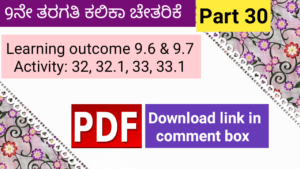
Kalika Chetarike activity 30 for 9th class students. 9.7 activity worksheet for 9th standard students. Key answer for activity 33 and 33.1.
In this post we are discussing learning out come and rubrics for Kalika chetarike. Activity worksheet and key answer. 9th class learning out come and rubrics for Kalika chetarike. 9th class Kalika Chetarike English.
To get more video notes for 9th class visit our YouTube channel. This channel is very useful for 9th standard exam preparation.
Download worksheet with key answer
9th class Kalika Chetarike English
Learning Outcome 9.6
Reads textual/ non-textual materials in English with comprehension, employing strategies like skimming, scanning, predicting, reviewing, previewing, inferring, and summarising, silent reading, etc.
Activity 32: Summarising
Activity 32.1: Read the text given and summarise
As daylight can be seen through even the smallest of holes, little things illuminate a person’s character. Indeed, character consists of little acts, well and honourably performed in our daily life. One of the most marked tests of our character is the manner in which we conduct ourselves towards others. A graceful behaviour towards superiors, inferiors and equals alike is the constant source of pleasure. It pleases others because it indicates respect for their personality; but it gives tenfold pleasures to us.
Every man may, to a great extent, be a self-educator in good behaviour, just as in everything else. He can be civil and kind, if he wills, though he may not have a coin in his purse. Even a kind look will give pleasure and confer happiness. Gentleness in society is like a silent influence of light which gives colour to all nature. It is more powerful than loudness of force, and far more beautiful.
Answer:
Character is very important everyone’s life. This character represents in our manner. Our decent behaviour is the main source of our happiness and pleasure. Money is not going to decide our status but kindness and civil nature does it. Silence is hopeful and happiness. Silence is powerful than loudness.
Learning Outcome 9.7
Writes answers to textual and non-textual questions after comprehension/ inference. Writes messages, notices, formal/ informal letters, descriptions, narratives, short personal/biographical experiences
Activity 33:
Short personal/ biographical experiences
Activity 33.1:
9th class Activity worksheet and key answer
Read and then write as directed.
Why are a child’s tears a joke? A boy around 7 was crying in the train. Everyone around him looked at him and thought that perhaps he didn’t get what he wanted. A toy may be or a bicycle. Even I just thought he lost a cricket match or had a fight with a friend. Not for once did we think something was really wrong. Something must have happened at home or school: physical and emotional neglect, bullying, exploitation or forced crimes.
Write your experience about your first day at school.
Answer:
Now, as I’m going to write about my first day of school, I think of June 5, 2013. That was my first day at school. I was so excited that day thinking of school. My parents bought me new clothes, shoes, and a bag. That’s how I got ready to start my school life.
I went to school holding my father’s hand. Dad took me to the headmaster’s room first. He asked me my name and a few questions, and I answered. He then wrote down my admission information and sent me to my class with the clerk.
In the first class, the teacher told us funny stories. Within a few days, I got my classmates as my friends. The day I went to school for the first will shine in my memory forever.
Watch this video for the explanation of Kalika Chetarike activity 30 for 9th class students.